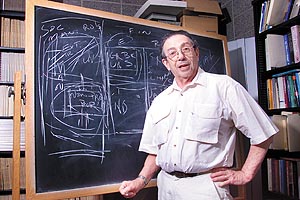Bernard Silberman, Professor in Political Science
By William HarmsNews Office
 Bernard Silberman |
Beginning three years ago, Silberman, Professor in Political Science, started offering courses based on readings from the thinkers and writers who influenced historical events, but who also are outside the traditional cannon made up of the heroes of rational thought. The courses provided him an opportunity for a new intellectual pursuit and rewarded students with some fresh outlooks on the problems of contemporary culture.
He has put together three courses on these works: “Losers,” “To Hell with the Enlightenment” and “Springtime for Hitler and Germany,” a course that will debut in the 2001-2002 academic year.
“I think of these courses as a kind of anti-core. We look at the counter-enlightenment, the dark side of the 19th and 20th centuries,” he said. As a result of the courses, students are encouraged to look at the world in a different way, to consider motivations and ideas that do not fit neatly into the demands of rational thought.
The cluster of writers Silberman has chosen put a great deal of value on the importance of aesthetic and feeling. They were the forerunners of National Socialism, a movement that created Nazism and Fascism.
Among the thinkers are Huston Stewart Chamberlain, a British author who was the composer Richard Wagner’s son-in-law. Chamberlain wrote Foundations of the 19th Century, a fundamentally racist text that was well read during the first part of the 20th century, but has since slipped almost completely from view. Chamberlain’s work influenced Hitler and those who supported his rise to power, however, and understanding it helps explain why the Holocaust took place.
For the courses, the students are required to submit weekly papers and come to class to discuss the readings. “I try to plant the text in a contemporary problem,” Silberman said. The students explore issues such as how change occurs in society.
He leads the students in a discussion of the role of violence in society, for instance. “One of the writers we study was a critic of Marx,” Silberman said. “His complaint was that the Communists of the 19th century did nothing but talk all the time. This writer pointed out that all significant social change comes through violence. I throw that idea out to the students and see if they agree.”
At first, many students oppose the notion of violence having any positive value. “But I point out to them examples of how violence accompanied significant change. American slavery was ended, for instance, through the opposition of the abolitionists and the Civil War.
Violence also was a part of the Civil Rights movement and women’s suffrage was won after a great deal of public protest. The discussion allows students to see that there are no simple answers to serious questions.
“I admit that this problem perplexes me,” Silberman said.
Finding the sources for the material he uses in class also is something of a challenge. Much of it is out of print, and since the authors are no longer considered fashionable, the books have not been preserved. Some are in foreign languages, which requires a hunt for good English translations.
Silberman uses the Internet to look for the books, and when he recovers the volumes he needs, he makes photocopies for his students.
“Preparing for these courses has been a tremendous learning experience for me,” he said. “I knew very little about these writers before I started seeking them out and putting the classes together, but I have found that they provide very powerful experiences for my students. They expose these young people to writers who see the importance of the sensual, of the sublime, of emotion, in examining and discovering the truth,” he explained.
![[Chronicle]](/images/small-header.gif)